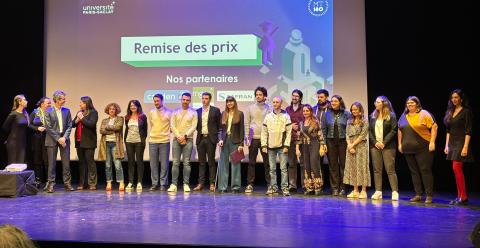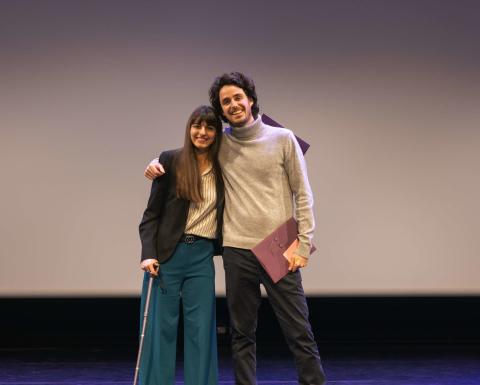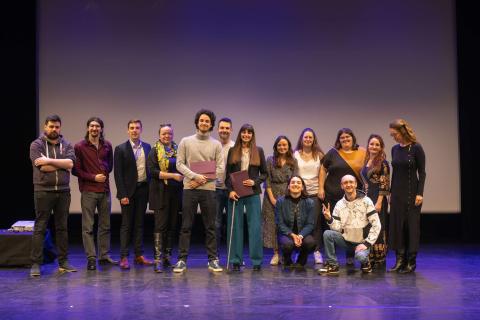
My Thesis in 180 seconds (MT180): the winners of 2024
Explaining months, even years of thesis research work in the simplest, most dynamic and entertaining way possible in just three minutes is no easy feat…but it is possible! Thirteen of the University’s PhD candidates took on that exact challenge during the final of the “My Thesis in 180 seconds” competition, which took place on Thursday 14 March 2024.
Noëlla Grossi received the Audience Award for her thesis, “Identification of compensatory mechanisms involved in the pathophysiology of R2 limb-girdle muscular dystrophy”. Noëlla Grossi is a PhD candidate at the I-STEM Laboratory (Univ. Paris-Saclay/INSERM/Univ. d’Evry).
The Jury’s Prize was awarded to Gaspard Fougea for his thesis, “Formal models for consciousness: from subjective experience to cognitive algorithms”. He is a PhD candidate at the Formal Methods Laboratory (LMF - Univ. Paris-Saclay/CNRS/ENS Paris-Saclay/CentraleSupélec/Inria).
The two winners will take part in the national semi-final of the competition at the end of March.
The eleven other finalists in 2024
- Amani Amri, PhD candidate at the Economics and Management research laboratory (RITM - Univ. Paris-Saclay), for her thesis “Experts and expertise management in an unstable R&D organisation”
- Clara Basto, PhD candidate at the Genome Integrity and Cancer laboratory (IGC - Univ. Paris-Saclay/Institut Gustave-Roussy/CNRS) for her thesis, “Molecular study on the roles of RAD51 and its partner proteins in the management of arrested replication forks”
- David Boulesteix, PhD candidate at the Process Engineering and Materials Laboratory (LGPM - Univ. Paris-Saclay/CentraleSupélec) for his thesis, “Study of the sample treatment of the DraMS and EMILI experiments and its impact on the results of the analysis of organic matter by the analytical chain (Pyr-GCMS) respectively on board the two NASA missions: Dragonfly and Europa Lander”
- Pierre Cry, PhD candidate at the Mathematics and Computer Science laboratory (MICS - Univ. Paris-Saclay/CentraleSupélec) for his thesis, “Model-checking driven assessment of clustering techniques for process mining”
- Coline Dubos, PhD candidate at the Laboratory of the Physics of the two Infinities Irène Joliot-Curie (IJCLab - Univ. Paris-Saclay/CNRS/Université Paris-Cité) for her thesis “High-energy gamma observation by CTA: origin of the Pevatrons and analysis of the NectarCam camera of the MST telescope”
- Guillaume Fossat, PhD candidate in the paramedical team for research on neuromotor disabilities - ERPHAN (Univ. Paris-Saclay/UVSQ) for his thesis “Interest of humidified high flow during spontaneous breathing trial in intensive care unit”
- Thomas Hussenot-Desenonges, PhD candidate at the Laboratory of the Physics of the two Infinities Irène Joliot-Curie (IJCLab - Univ. Paris-Saclay/CNRS/Université Paris-Cité) for his thesis, “Follow-up of LIGO/Virgo gravitational wave alerts by the GRANDMA network”
- Alice Karsenti, PhD candidate at the Paris-Saclay Geosciences Laboratory (GEOPS - Univ. Paris-Saclay/CNRS) for her thesis, “Relationships between mineral dust, primary productivity and Indian monsoon in the Arabian Sea through the last 24,000 years”
- Camille Martin--Cavaillé, PhD candidate at the Paris-Saclay Mechanics Laboratory (LMPS - Univ. Paris-Saclay/CentraleSupélec/ENS Paris-Saclay/CNRS) for her thesis, “Valorisation of limestone co-products from aquaculture in insulating load-bearing concrete”
- Mélanie Pietri, PhD candidate at the Light, Materials and Interfaces Laboratory (LuMin - Univ. Paris-Saclay/ENS Paris-Saclay/CNRS/CentraleSupélec) for her thesis, “Predictive modelling of the synergistic effect of a microalgae-bacteria co-culture to improve bioenergy processes - from microfluidic systems to bioreactors”
- Dan Pineau, PhD candidate at the Institute of Space Astrophysics (IAS - Univ. Paris-Saclay/CNRS) for his thesis, “Fusion of multispectral and hyperspectral data: application to the JWST/MIRI instrument”.
The 2024 edition of the My Thesis in 180 seconds (MT180) competition was organised for the 11th consecutive year by France Universités, the French National Centre for Scientific Research (CNRS) and Université Paris-Saclay, in partnership with CASDEN Banque Populaire and MGEN. The competition gives PhD candidates the chance to present their research to a non-expert and diverse audience. Competitors must present their work in French, clearly and concisely but convincingly. All that in just three minutes with the help of a single PowerPoint slide!
The final was presented by Daniel Fievet and broadcast live on the Université Paris-Saclay YouTube channel.


